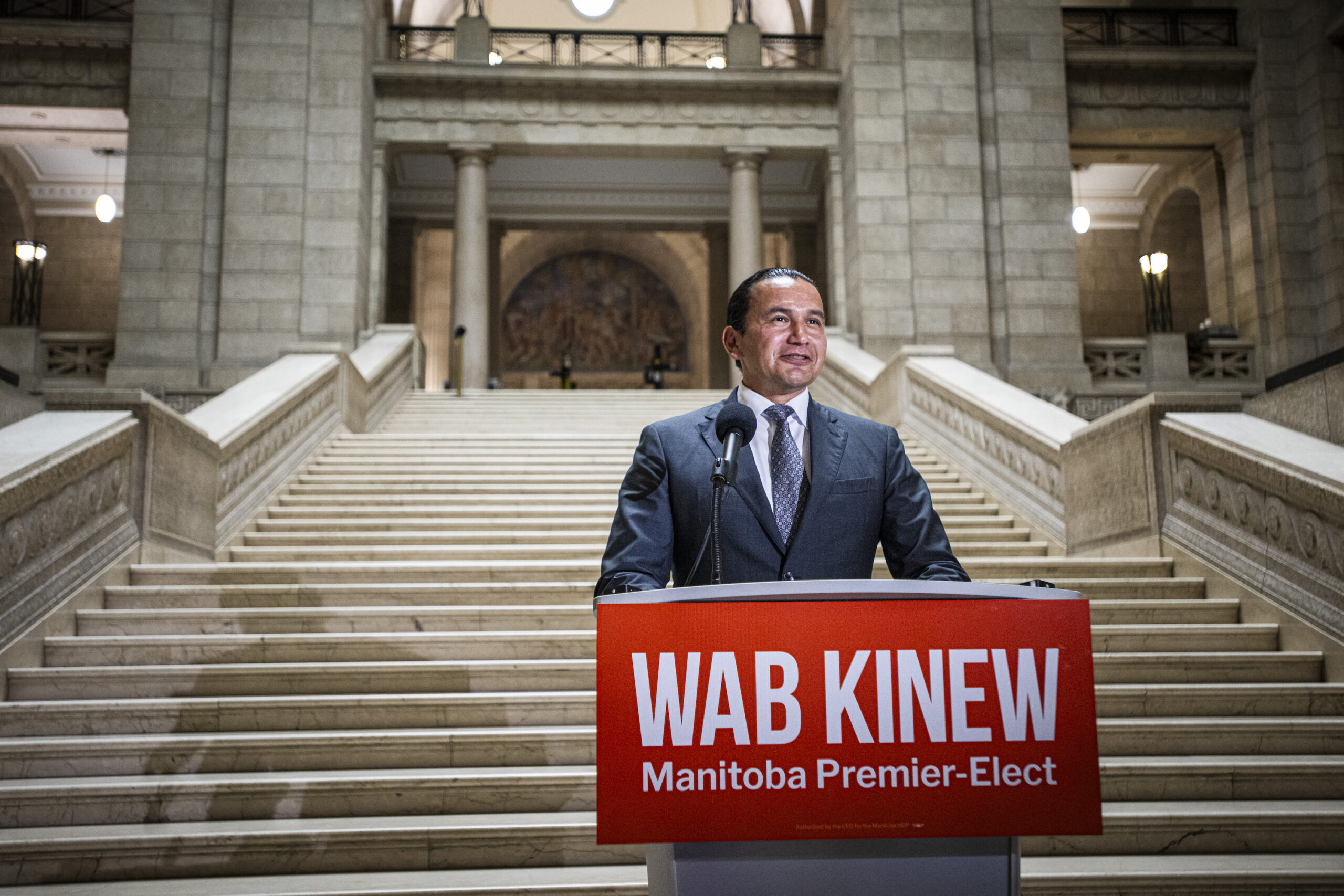An NDP government in Manitoba and the province’s first First Nations Premier
An historic end to Manitoba’s 43rd general election on Tuesday evening saw Manitoba’s NDP, led by Wab Kinew, secure a majority government. As of Wednesday afternoon, Kinew’s NDP had been elected or leading in 34 of the province’s 57 ridings, while the Manitoba PC Party had been elected or leading in 22 ridings. There are a number of seats that remain too close to call or will undergo a recount in the coming days, but the overall result has been confirmed.
With the victory, Wab Kinew becomes the first First Nations provincial premier in Canada’s history. He led the Manitoba NDP to a majority government thanks in large part to an “orange wave” in the suburbs of Winnipeg.
Both Heather Stefanson and Dougald Lamont have announced they will step down as leaders of the PC Party and Manitoba Liberal Party, respectively. The Manitoba Liberal’s saw their caucus reduced to a single seat.
The Manitoba PC Party will form the official opposition, leading or elected in 22 seats as of Wednesday. The Manitoba Liberal Party lost two of their three seats from the previous legislature, including the now former-leader Dougald Lamont. Cindy Lamoureux was the party’s only MLA to win her seat in Tyndall Park.
Aside from the election of the first Annishinaabeg provincial premier, the Manitoba election made history in other ways as well. Logan Oxenham (Kirkfield Park) became the first Trans person elected at the provincial or federal level in Canada. A record number of voters cast advanced ballots in 2023, more than 200,000 ballots were cast from September 23 to 30. Electronic voting machines were also used in a Manitoba election for the first time.
The Manitoba PC Party
After seven years in government, when Brian Pallister formed government as leader in the 2016 election, the Manitoba PC Party under Leader Heather Stefanson appeared to be a government running out of steam. Consistently polling behind the opposition NDP since taking office as premier in 2021, Stefanson was also routinely the lowest polling premier in Canada. Described by her opponents as out-of-touch, Stefanson tried to convince voters that her party was the best to implement needed changes and reform both the health care system across the province, and education.

Leading up to and during the campaign, the Manitoba NDP supported the search of a privately owned landfill in the Winnipeg area, believed to contain the remains of two Indigenous women, who city police believe were murdered by a serial killer in 2022.
Stefanson and the PC Party made a decision to not support a search of the landfill, citing safety of workers, complexity and cost as reasons, and made the issue a central part of their campaign. This drew sharp criticism from the families of the missing women, Indigenous leaders in Manitoba and many others across the country.
The PC Party also campaigned on plans to expand “parental rights” in public schools, tax cuts, crime reduction programs.
As a result, cabinet ministers Audrey Gordon (Southdale), Rochelle Squires (Riel), Janice Morley-Lecomte (Seine River) and James Teitsma (Radisson) lost their seats to NDP candidates.
Manitoba’s NDP
Wab Kinew and Manitoba’s NDP were well positioned heading into the 2023 election. His party was set to face-off against an unpopular government, with an unpopular premier in her first campaign as leader of the party. After seven years of PC government under Brian Pallister, and Heather Stefanson, the party was on the decline before the writ period. But a strong campaign and advertising strategy from the PC’s had them polling neck and neck with the NDP heading into the election, with the gap between both parties widening in favour of New Democrats in the final days before election day.
The Manitoba NDP were focused on bringing people together and presenting a hopeful offer to Manitobans to move forward together. They showed discipline throughout the campaign by remaining focused on their main pillars: fixing health care and making life more affordable.
Kinew and the NDP campaigned largely on health-care reform and are leading or elected in 34 of the Manitoba legislature’s 57 seats as of Wednesday.
Their main campaign promises were fixing health care staffing by hiring back 300 nurses, building four new emergency rooms, three in Winnipeg and one in Eriksdale, freezing hydro rates and creating more jobs in the province.
In the party’s campaign platform, Kinew promised to hire hundreds of doctors, nurses and paramedics to ease the staffing crisis in provincial health care and reopen three Winnipeg emergency rooms, and one rural emergency room in Eriksdale.
Healthcare, education and reconciliation
Health-care reform, making life more affordable and reconciliation were the major themes on the campaign trail. Kinew and the Manitoba NDP positioned Heather Stefanson and the PC Party as having broken health care in the province and as not doing enough to make people’s lives more affordable.
On health care, Kinew’s plans centred on a $500 million health care staffing strategy. They promised their plan will improve health care at every level from re-opening emergency rooms to increasing health care for families and better primary care. The NDP is looking to inspire the next generation of health care workers and care for patients with centres of excellence in areas like cardiac care, cancer, women’s health and joint surgery.
On affordability, the Manitoba NDP promised to lower costs for families and grow the economy with good jobs. Central to that are the NDP’s commitments to freeze Hydro rates for one year, cut the gas tax while inflation remains high, bring in real $10/day childcare, and create a renter’s tax credit.
What’s next for Wab Kinew?
In his election night speech, Kinew made it clear that Manitoba’s NDP team will give everything they have for the next four years to serve Manitobans to make life better. His frame of hope throughout the campaign, was consistently reflected in his election night speech, repeating that together, Manitobans are capable of great things.
On Wednesday morning, Premier-designate Kinew addressed media briefly from the Manitoba legislature. He said the first 100 days of his government will focus on delivering immediate help to families and beginning the staffing up of the health care system his party campaigned on.
Kinew said to media, “the results last night show that Manitobans want us to focus on health care system and deliver on affordability.”
“I didn’t run on being the first First Nations premier. I put my name on the ballot to try and be the best premier, because that’s what the people of this province deserve.”
He said he will share information about the transition team he will assemble on Thursday. While he did not elaborate on who would be taking a role on the transition team, it’s expected that his campaign manager Brian Topp, a veteran political strategist for the NDP, he was the chief of staff to former Alberta Premier Rachel Notley and deputy chief of staff to former Saskatchewan Premier Roy Romanow, will play a senior role in the transition.
Mark Rosner, Kinew’s chief of staff as opposition leader, is also expected to hold a senior role on the transition team and in the premier’s office under Kinew. His exact role is yet to be determined, but he could remain chief of staff.
When asked about his plans for the new cabinet, Kinew said he couldn’t comment on the number of ministers he will appoint, but he said he believes it will be smaller than the current cabinet.
When asked about mandate letters for his new cabinet, Kinew said he would be issuing mandate letters to his cabinet and would make them public, though no timeline was given.
As for potential cabinet appointments, Premier-designate Kinew will have some difficult choices to make if he decides to reduce the size of the cabinet. A full roster of MLAs served as critics for the previous cabinet, but a number of standouts are expected to play big roles in Wab Kinew’s new cabinet.
- Matt Wiebe (Concordia) served as party whip and the critic for justice and Manitoba Insurance Corporation.
- Adrien Sala (St. James) served as critic for finance and Manitoba Hydro.
- Nahanni Fontaine (St. Johns) served as house leader and critic for families and veterans affairs.
- Uzoma Asagwara (Union Station) served as critic for health.
As well, Renée Cable (Southdale) and Tracy Schmidt (Rossmere) are newly elected MLAs who were able to flip strategic PC seats for the NDP and may be in line for a cabinet role as a result.
What’s next for Heather Stefanson and the Manitoba PC Party?
With the result on Tuesday evening, Premier Heather Stefanson addressed her supporters and congratulated Wab Kinew on the historic win for his party. She also announced that she would be resigning as leader of the Manitoba PC Party. As of Thursday, it was unclear if she would continue to sit in the legislature as MLA. She narrowly defeated her NDP counterpart by fewer than 300 votes on Tuesday evening.
Stefanson did not elaborate on who would succeed her as party leader on an interim basis, or the timeline for a leadership vote. The party will have plenty to consider over the coming weeks on its future.
There will also be plenty of speculation about who will enter the race to replace Stefanson as leader. Former federal Conservative MP for Portage-Lisgar and interim party leader Candice Bergen served as campaign chair and advisor for Stefanson and the PC Party. She retired as MP earlier this year before taking on the role as campaign chair. Should Bergen enter the race, she would be considered a front-runner for the job, but that remains purely speculation for the time being.
Polling


Heading into the final week of the campaign, the polling aggregator 338Canada projected a very tight split in popular vote between the incumbent PC Party and Manitoba’s NDP. On September 24, it projected Wab Kinew’s NDP at 46 per cent ahead of Heather Stefanson’s PC Party with 43 per cent, but both parties within the margin of error for the other. With both parties polling above 40 per cent, the race was close and ultimately the decision came down to vote efficiency and the battlegrounds of the Winnipeg metropolitan area.
With some results yet to be confirmed and some votes still being counted, the unofficial results from Elections Manitoba showed the NDP securing 218,532 votes or approximately 45.6 per cent of the popular vote. The PC Party had received 199,613 votes, or approximately 41.7 per cent of the popular vote. Manitoba’s Liberal Party received 51,476 votes, or approximately 10.7 per cent.
Overall turnout in the election was 54 per cent, though results remain unofficial as some ballots remain to be counted by Thursday morning.
Former NDP Opposition Critics
- Nello Altomare (Transcona): Education and early childhood learning.
- Uzoma Asagwara (Union Station): Health.
- Diljeet Brar (Burrows): Agriculture.
- Ian Bushie (Keewatinook): Deputy house leader, transportation and infrastructure.
- Nahanni Fontaine (St. Johns): House leader, families and veterans affairs.
- Amanda Lathlin (The Pas-Kameesak): sports, culture and heritage.
- Tom Lindsey (Flin Flon): Natural resources and northern development.
- Jim Maloway (Elmwood): Seniors and long-term care.
- Malaya Marcelino (Notre Dame): Labour and immigration.
- Jamie Moses (St. Vital): Advanced education and training.
- Lisa Naylor (Wolseley): Deputy caucus chair, municipal relations and MLLC.
- Eric Redhead (Thompson): Indigenous reconciliation and northern relations.
- Adrien Sala (St. James): Finance and Manitoba Hydro.
- Mintu Sandhu (The Maples): Consumer protection and government services.
- Bernadette Smith (Point Douglas): Caucus chair, mental health and community wellness.
- Mark Wasyliw (Fort Garry): Economic development, investment and trade, environment and climate change and Efficiency Manitoba
- Matt Wiebe (Concordia): Whip, justice and Manitoba Insurance Corporation.
